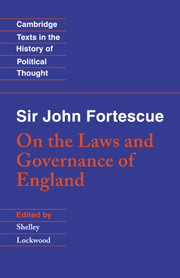Book contents
- Frontmatter
- Contents
- Acknowledgements
- Editor's note on the texts
- Note on the translations
- Introduction
- Principal events in Fortescue's life
- Select bibliography
- List of abbreviations
- In Praise of the Laws of England
- The Governance of England
- Appendices
- Appendix A Extracts from On the Nature of the Law of Nature
- Appendix B Example of how good council helps and advantages and of what follows from the contrary
- Appendix C Articles to the Earl of Warwick 1470
- Index
- Cambridge Texts in the History of Political Thought
Appendix B - Example of how good council helps and advantages and of what follows from the contrary
Published online by Cambridge University Press: 05 June 2012
- Frontmatter
- Contents
- Acknowledgements
- Editor's note on the texts
- Note on the translations
- Introduction
- Principal events in Fortescue's life
- Select bibliography
- List of abbreviations
- In Praise of the Laws of England
- The Governance of England
- Appendices
- Appendix A Extracts from On the Nature of the Law of Nature
- Appendix B Example of how good council helps and advantages and of what follows from the contrary
- Appendix C Articles to the Earl of Warwick 1470
- Index
- Cambridge Texts in the History of Political Thought
Summary
This is an alternative version of chapter 16 of The Governance, above 117–18. It is taken from Yelverton MS 35 and was printed by Clermont (1869 edn) 475–6 and by Plummer (1885 edn), 347–8. I have modernised the spelling and punctuation of the original.
O what good wealth and prosperity should grow to the realm of England if such a council should be once perfectly established and the king guided thereby. The Romans who by wisdom and manhood got the lordship and monarchy of the world were first governed by kings; but when the kings through insolence, following their passions, left the council of the senate, the Romans rose upon them and put away their kings for evermore. And then they were ruled by the senators, and by consuls politically many years, by whose wisdom they got the lordship of a great part of the world. But after their great wealth, by division that fell between the consuls for lack of one head, they had amongst them civil battles, wherein at some one debate more than eighty thousand of them were slain and exiled. And after that they were governed by one head called an emperor, who, using in all his rule the council of the senate, got the monarchy of the world. So that at Christ's birth, the emperor commanded the whole world to be described as subjects unto him.
- Type
- Chapter
- Information
- Sir John Fortescue: On the Laws and Governance of England , pp. 137 - 138Publisher: Cambridge University PressPrint publication year: 1997



